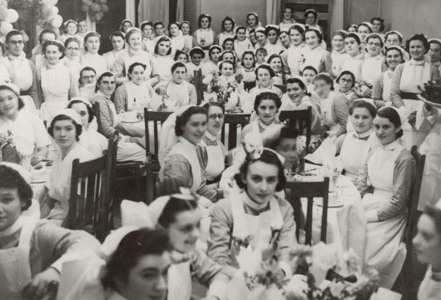The First People’s History of the NHS
 Team of historians at University of Warwick launch first ever national initiative to document the effects of the NHS on people’s lives and create a virtual museum of the NHS.
Team of historians at University of Warwick launch first ever national initiative to document the effects of the NHS on people’s lives and create a virtual museum of the NHS.
Nigel Lawson observed that ‘the National Health Service is the closest thing the English have to a religion’. Yet we are also acutely aware that this is an institution whose very future is now regularly in question.
Astonishingly, given the sheer scale of its impacts on local and regional communities, and on Britain’s national and international identity, the cultural history of this key institution of post-war British life remains largely undeveloped.
With the support of the Wellcome Trust, a team of historians at the University of Warwick will coordinate and facilitate the People’s History of the NHS website. The website aims to reach out to anyone and everyone, whether this is just to read about its findings, or to contribute views, memories, and historical materials. The website will be the home for a truly collaborative history, a place for debate, and a venue for fresh thinking about what the NHS has meant.
The People’s History of the NHS team is working closely with the University Hospitals Coventry and Warwickshire NHS Trust who will be hosting events in the coming months where local people can call in to tell their stories and contribute to the People’s History of the NHS. Dates of these events will be published on the People’s History of the NHS website.
Dr Roberta Bivins, Associate Professor of History at the University of Warwick said,
‘Through the new People’s History of the NHS website, and with the help of the public, we can better understand what the NHS has meant to the British people from its opening in 1948 up to its forthcoming 70th anniversary in 2018.’
The People’s History website will centre on three main projects:
1. A People’s Encylopaedia of the NHS. This will examine the history of meaning through an expanding series of encyclopaedia entries. The entries will touch on issues often missing from the standard histories of politics and policy, triggering memory, raising new historical questions, and crucially acting as a catalyst for a new history of experience, meaning and belief. The aim is to encourage reflection, but also at times to surprise, amuse, and provoke.
2. A Virtual Museum of the NHS. Given its place in the national psyche, it is rather extraordinary that there is no museum of the NHS. The website will therefore host a virtual museum on the history of the NHS. Arranged in a series of themed Galleries, which will be regularly opened over the course of the project, the Virtual Museum will look to the cooperation of the public in helping to unearth a material and visual culture of the NHS that is fast in danger of being lost.
3. MyNHS. Members of the public will also be able to sign up to become part of the extended research team. The website will provide details of events around the country that will bring people and communities together to discuss their histories of the NHS. The MyNHS members’ section will also enable members of the public to submit their own stories, suggest topics for research, and respond to regular calls for information and memories on particular issues.
Share with us your story of the NHS. No topic is too obscure, no memory too hazy. We want to know anything you might have to share about the place of the NHS within your life.
You can visit the website at: http://peopleshistorynhs.org/
Click below to enter the MyNHS area where you can hear about our latest news as well as contribute your stories, suggest a topic and read other member's NHS stories:
http://peopleshistorynhs.org/member-register/
18/02/2016 - AB
Notes to editors:
Images available: http://peopleshistorynhs.org/#fndtn-museum
Alex Buxton
Communications Manager
Tel: 02476 150423
Mob: 07876 218166
a.buxton.1@warwick.ac.uk

